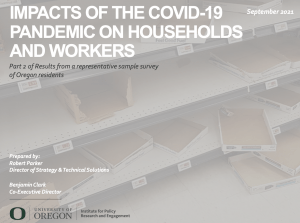The Institute for Policy Research and Engagement is seeking candidates to join our team as an Economic Development Analyst.
Review of Applications Begins
January 3, 2022; position open until filled.
Special Instructions to Applicants
Along with your online application, please submit a resume, a cover letter (no more than two pages), and names and current contact information for three references. In your cover letter, be sure to address how you meet the qualifications and competencies of this position.
Department Summary
The Institute for Policy Research and Engagement (IPRE) is an interdisciplinary research institute in the School of Planning, Public Policy and Management at the University of Oregon. The role of IPRE is to link the diverse perspectives, skills, expertise, and innovation of higher education with the planning, policy, and management needs identified by our organizational and community collaborators. IPRE provides technical assistance, capacity, and basic research services using an experiential learning model. In this way, we help resolve local issues, address resource gaps, and improve the quality of life for our project partners while providing future planners, policymakers, and community leaders with opportunities to apply what they are learning through work on real-world projects.
IPRE actively seeks to promote diverse thinking, equity of voice, and inclusivity in everything we do. Candidates with varied backgrounds, language fluencies, lived experiences, and skillsets are welcome to apply for positions with our team. We strongly encourage candidates from diverse racial, ethnic, and cultural backgrounds, women, LGBTQ+ individuals, and persons with disabilities to apply.
Position Summary
The Institute for Policy Research & Engagement (IPRE) Economic Development Analyst will coordinate and direct technical analysis on projects primarily within IPRE’s Economic Development Portfolio. This position reports to the Associate Director for Applied Research and works with IPRE program faculty, staff, and students. This is a funding-contingent position. Activities will include developing, conducting, supporting, and managing research and analysis tasks and projects. Responsibilities will include developing and stewarding relations with external partners, identifying economic development needs in Oregon and regions of the state, preparing work programs, managing applied research related to economic development, and grant reporting. The position may also include management, guidance, and direct supervision of graduate and undergraduate student research teams and paid graduate and undergraduate research assistants. Additionally, this position may support IPRE’s other program areas including our off-campus service-learning branch, the Resource Assistance for Rural (RARE) AmeriCorps Program. This position will require statewide and limited overnight travel.
Minimum Requirements
- Master’s Degree in Economics, Economic Development, Planning (Community, Regional, or Urban), Public Administration/Affairs, Public Policy, or related field; Bachelors degree with five or more years of professional experience may substitute for a masters degree.
- Two years of demonstrated work experience in one or more of the following areas: economic research, economic development, economic justice, economic democracy, economic resilience, financial analysis, business development, market research, budget analysis, applied research related to economics. Work experience may include paid internships or professional projects conducted during graduate school.
Professional Competencies
- Ability to communicate effectively with diverse communities and audiences, including oral and written communication.
- Ability to present research results using reports, tables, figures, and charts.
- Understanding of economic development practices, business development, workforce development, economic justice, entrepreneurial ecosystems, and innovation ecosystems.
- Awareness and understanding of common economic data sources and data collection approaches.
- Skills and experience in stakeholder engagement, public outreach, public involvement coordination, and small group facilitation.
- Experience with mailed or internet survey design, administration, and analysis.
Preferred Qualifications
- Experience with a statistical software package (Stata/SPSS/SAS/R) or similar statistical software.
- Ability to design, code, run, and report out statistical analysis using OLS, MLE, and other modeling techniques as appropriate.
- Experience using ArcGIS to conduct data analysis.
- Experience interpreting and forecasting market trends.
- Professional experience in a government agency.
For more information and to apply, visit here: https://careers.uoregon.edu/en-us/job/528579/economic-development-analyst
